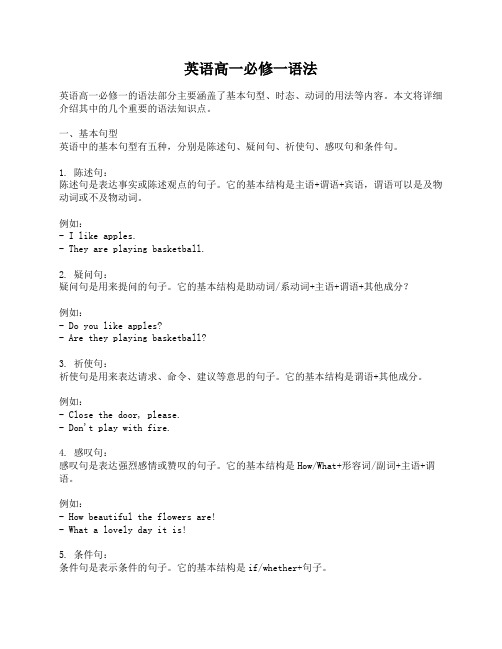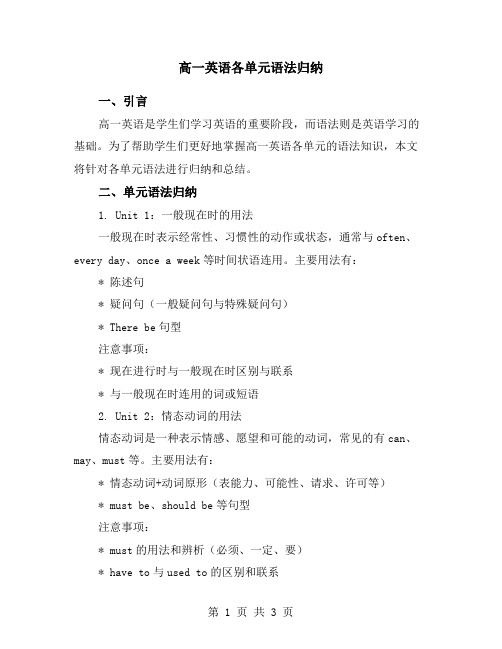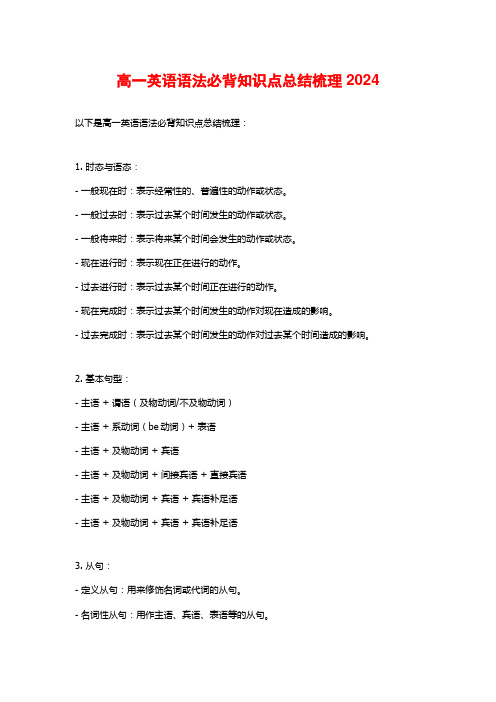高一英语语法知识讲解
高一英语必修一语法知识总结

高一英语必修一语法知识总结不要觉得英语很难,它不难,只要认真去学,肯定能学好。
今天小编在这给大家整理了高一英语必修一语法知识总结,接下来随着小编一起来看看吧!高一英语必修一语法知识总结一般现在时、现在进行时、-ing形容词和-ed形容词的用法考点1:一般现在时的用法1.表示经常性、习惯性的动作。
句中常出现often, usually, sometimes, always, every day等状语。
He goes to school at seven o'clock every day. 他每天七点去上学。
She always takes a walk in the evening. 她常在晚间散步。
We always care about and help each other. 我们总是互相关心、互相帮助。
2.表示普遍的真理、科学事实,也用在格言中。
Light travels faster than sound. 光比声音传播得快。
Actions speak louder than words. 行动比言语更为响亮。
3.在时间状语从句和条件状语从句中,通常用一般现在时代替一般将来时。
When I graduate, I'll go back to the countryside. 我毕业后将回农村。
They won't come to see us if it rains next Sunday. 如果下周日下雨,他们就不会来看我们了。
4.表示按规定或时刻表将要发生的动作,仅限于少数动词,如begin, leave, go, arrive, start等。
The meeting begins at eight. 会议八点开始。
The train starts at nine in the morning. 火车早上九点出发。
5.表示主语的特征、性格或说话时的感觉、状态。
英语高一必修一语法

英语高一必修一语法英语高一必修一的语法部分主要涵盖了基本句型、时态、动词的用法等内容。
本文将详细介绍其中的几个重要的语法知识点。
一、基本句型英语中的基本句型有五种,分别是陈述句、疑问句、祈使句、感叹句和条件句。
1. 陈述句:陈述句是表达事实或陈述观点的句子。
它的基本结构是主语+谓语+宾语,谓语可以是及物动词或不及物动词。
例如:- I like apples.- They are playing basketball.2. 疑问句:疑问句是用来提问的句子。
它的基本结构是助动词/系动词+主语+谓语+其他成分?例如:- Do you like apples?- Are they playing basketball?3. 祈使句:祈使句是用来表达请求、命令、建议等意思的句子。
它的基本结构是谓语+其他成分。
例如:- Close the door, please.- Don't play with fire.4. 感叹句:感叹句是表达强烈感情或赞叹的句子。
它的基本结构是How/What+形容词/副词+主语+谓语。
例如:- How beautiful the flowers are!- What a lovely day it is!5. 条件句:条件句是表示条件的句子。
它的基本结构是if/whether+句子。
例如:- If it rains tomorrow, we will stay at home.- Whether she comes or not, I will go to the party.二、时态在英语中,时态用于表示动作发生的时间。
高一必修一中涵盖了一般现在时、一般过去时、一般将来时等几个基本时态。
1. 一般现在时:一般现在时用于表示经常性的动作、习惯、真理、科学事实等。
它的基本结构是主语+谓语。
例如:- She goes to school every day.- Water boils at 100 degrees Celsius.2. 一般过去时:一般过去时用于表示过去发生的动作或状态。
高一英语必考知识点全部

高一英语必考知识点全部英语学习对于高中生来说,是一项必修课程,也是重要的考试内容。
下面就是为大家总结的高一英语必考知识点。
一、语法知识点1. 动词时态与语态英语中有多种时态,例如一般现在时、一般过去时、现在进行时等。
了解各个时态的构成和用法,以及被动语态的形式与应用。
2. 从句结构与用法了解主从复合句的构成和关系,包括定语从句、名词性从句和状语从句等。
掌握从句引导词的用法和位置。
3. 并列连词与关联词熟悉常用的并列连词如and、but、or以及关联词如because、although等。
掌握它们的用法和连接不同句子成分的能力。
4. 句型转换与句子结构调整学会对句子进行转换和调整,如同义句转换、被动语态转换、间接引语转换等。
二、词汇知识点1. 常用词汇掌握常用的英语单词和短语,包括名词、动词、形容词和副词等。
积累词汇的同时,了解它们的词性和用法。
2. 同义词和反义词学会识别和运用同义词和反义词,提高语言的表达能力。
注意它们的用法和搭配。
3. 词组与固定搭配了解一些常见的词组、习语和固定搭配,并能正确运用于实际语境中。
三、阅读理解知识点1. 阅读技巧掌握阅读理解的技巧,包括略读、扫读和精读。
了解如何根据问题和选项进行有针对性的阅读。
2. 理解文章结构学会分析文章的结构,包括段落的顺序、主题句和支持句的关系等。
能够准确地找到文章的主旨和关键信息。
3. 掌握常见题型熟悉并掌握常见的阅读理解题型,如选择题、填空题、判断题和配对题等。
了解不同题型的解题思路和答题技巧。
四、写作技巧知识点1. 作文结构掌握作文的结构,包括引言、正文和结论。
确保文中的段落有机衔接,逻辑清晰。
2. 表达思想能够清晰地表达自己的思想和观点,运用适当的词汇和句子结构。
写作时要注意语法和拼写错误。
3. 文章连贯性写作时注意段落和句子之间的连贯性,使用适当的过渡词和连接词,使文章更易读懂,逻辑更清晰。
五、听力技巧知识点1. 听力细节在听力理解中,要注意捕捉细节信息,如数字、日期、时间等。
高一英语重点语法知识点总结归纳5篇分享

高一英语重点语法知识点总结归纳5篇分享高一英语语法1一般现在时1. 表示现在习惯或经常反复发生的动作或存在的状态, 常与usually, always, sometimes, often, every day /week / month / year等时间状语连用.[例句] He often does his homework in his study.2. 表示主语现在的特征.性格和状态.[例句] The dictionary belongs to me.3. 表示客观规律或科学真理.格言, 以及其他不受时间限制的客观存在.[例句] The moon goes around the sun.4. 在有连词if, unless, before, as soon as, when, once,however等引导的时间.条件和让步状语从句中, 用一般现在时表将来.[例句] If you work hard, you won’t fail in the e_am.高一英语语法2(一) 语法一致原则: 即主语为单数,谓语用单数,主语为复数,谓语也用复数.以下为注意事项: 1. 单数主语即使后面带有with , alongwith, together with, like(象), but (除了),e_cept, besides, as well as, no lessthan, rather than(而不是), including, in addition to 引导的短语, 谓语动词仍用单数.如: Air as wellas water is matter. 空气和水都是物质.No one e_cept two servants was late for the dinner.除了两个仆人外, 没有一个人迟来用餐. 2. 用and连接的并列主语,如果主语是同一个人,同一事,同一概念, 谓语动词用单数, 否则用复数.如: Thepoet and writer has come. 那位诗人兼作家来了.(一个人) A hammer and a saw are useful tools.锤子和锯都是有用的工具. (两样物) 用and连接的成对名词习惯上被看成是一个整体, 如:bread and butter(黄油抹面包), knife andfork(刀叉)等作主语时, 谓语动词用单数. 3. 不定式(短语), 动名词(短语),或从句作主语时, 谓语动词用单数. 如: Serving thepeople is my great happiness. 为人民服务是我的幸福. When we’ll go out for an outing hasbeen decided. 我们什么时候出去郊游已决定了. 4. 用连接的并列主语被each, every 或no修饰时, 谓语动词用单数. Every boyand every girl likes to go swimming. 每个男孩和每个女孩都喜欢去游泳. No teacher and no studentwas absent from the meeting. 没有老师也没有学生开会缺席. Each man and (each) woman is askedto help. 每个男人和每个女人都被请去帮忙. 5. each of + 复数代词, 谓语动词用单数. 复数代词+each, 谓语动词用单数.如: Eachof us has something to say. 我们每个人都有话要说. 6. 若主语中有more than one 或many a/an ,尽管从意义上看是复数, 但它的谓语动词仍用单数. 但more+复数名词+than one 做主语时, 谓语动词仍用复数. 如: Many a boy likesplaying basketball. 许多男生都喜欢打篮球. More than one student was late. 不只一个学生迟到 Morepersons than one come to help us. 不止一个人来帮助我们. 7. none 做主语时,谓语动词可用单数, 也可用复数;但在代表不可数的东西时总是看作单数,因而谓语动词要用单数. 如: None of us are (is) perfect. 人无完人. None of thisworries me. 这事一点不使我着急. 8. 名词如: trousers, scissors, clothes, goods, glasses等作主语时, 谓语动词必须用复数. 如: His clothes are good. 但这些名词前若出现 a pair of , 谓语一般用单数.如: Apair of glasses is on the desk. 桌上有一副眼镜. 9. 形复意单名词如:news ; 以ics 结尾的学科名称如:physics, mathematics, economics; 国名如: the United States; 报纸名如: theNew Times;书名如: Arabian Night 天方夜谈以及The United Nations 联合国等作主语时, 谓语动词用单数.10. 〝a +名词+and a half 〝, 〝one and a half + 名词〞, 〝the number of + 名词〞等作主语时,谓语动词要用单数. 如: Only one and a half apples is left on the table. 注意: one or two +复数名词作主语, 谓语动词用复数形式, 如: One or two places have been visited. 参观了一两个地点.高一英语语法3一般将来时1. 表示将来发生的动作或存在的状态, 常与表示将来的时间状语连用.[例句] I don’t know what will happen in the future.2. 常用来表示将来时的结构包括:(1) shall / will + 动词原形:(单纯) 表将来, 一般不用于条件句.(2) be going to + 动词原形:(计划)打算做…….(3) be about to + 动词原形:即将或正要去做某事,通常不与时间状语连用,但可与when引导的从句连用.(4) be to + 动词原形:预定要做…….(5) be doing 表示按计划.安排即将发生的动作,常与go, start, set out, leave, reach, arrive,return, come, move等表位移的动词连用.高一英语语法4非真实条件句1)时态:可以表示过去,现在和将来的情况.它的基本特点是时态退后.a. 同现在事实相反的假设.句型 : 条件从句主句一般过去时 should( would) +动词原形If they were here, they would help you.b. 表示于过去事实相反的假设.句型: 条件从句主句过去完成时 should(would) have+ 过去分词If she had worked harder, she would have succeeded.The rice would not havebeen burnt if you had been more careful.If my lawyer had been here last Saturday, he would have prevented me fromgoing.If he had come yesterday, I should / would have told him about it.含义:He did not come yesterday, so I did not tell him about it.If he had not been ill and missed many classes, he would have made greaterprogress. 含义: He was ill and missed many lessons, so he did not make greaterprogress.c. 表示对将来的假想句型: 条件从句主句一般过去时 should+ 动词原形were+ 不定式 would + 动词原形should+ 动词原形If you succeeded, everything would be all right.If you should succeed, everything would be all right.If you were to succeed, everything would be all right.高一英语语法5一. 直接引语和间接引语(一)直接引述别人的原话,叫做直接引语;用自己话转述别人的话,叫做间接引语.间接引语一般构成宾语从句.直接引语必须放在引号内,间接引语则不用引号.直接引语改为间接引语时,除将引语部分变成宾语从句外,还必须对直接引语中的人称.时态.指示代词.时间状语.地点状语等进行改变.1. 时态的变化:直接引语变为间接引语时,通常受转述动词said,asked等的影响而使用过去化的时态,即把原来的时态向过去推,也就是一般现在时变为一般过去时,现在进行时变为过去进行时,等等.例如:Tom said to me,〝My brother is doing his homework.〞→Tom said to me that his brother was doing his homework.2. 人称代词.指示代词.时间状语.地点状语等等的变化: 根据意义进行相应的变化,例如:She asked Jack,〝Where have you been?〞→She asked Jack where he had be en.He said,〝These books are mine.〞→He said t hat those books were his.(二)直接引语改为间接引语时,都使用陈述语序,但是因为原句的句式不同,所以变成间接引语时所用的连词会有所不同.直接引语如果是一般疑问句,用连接词whether或if;如果是特殊疑问句,则用疑问词引导间接引语.转述的动词一般用asked,可以在其后加上一个间接宾语me,him, her, us等.如:She said,〝Is your father at home?〞→She asked me i f/whether my father was at home.〝What do you do every Sunday?〞My friend asked me.→My friend asked me what I did every Sunday.直接引语如果是祈使句,改为间接引语时,要将祈使句的动词原形变为带to的不定式,并在不定式的前面根据原句的语气(即请求或命令)加上ask, tell,order等动词,如果祈使句为否定式,则在不定式前加not.其句型为:ask / tell / order someone (not) to dosomething. 例如:She said to us,〝Please sit down.〞→She asked us to sit down.He said to him,〝Go away!〞→He ordered him to go away.He said, 〝Don’t make so much noise, boys.〞→He told the boys not to make so much noise.最新高一英语重点语法知识点总结归纳5篇分享。
高一英语各单元语法归纳

高一英语各单元语法归纳一、引言高一英语是学生们学习英语的重要阶段,而语法则是英语学习的基础。
为了帮助学生们更好地掌握高一英语各单元的语法知识,本文将针对各单元语法进行归纳和总结。
二、单元语法归纳1. Unit 1:一般现在时的用法一般现在时表示经常性、习惯性的动作或状态,通常与often、every day、once a week等时间状语连用。
主要用法有:* 陈述句* 疑问句(一般疑问句与特殊疑问句)* There be句型注意事项:* 现在进行时与一般现在时区别与联系* 与一般现在时连用的词或短语2. Unit 2:情态动词的用法情态动词是一种表示情感、愿望和可能的动词,常见的有can、may、must等。
主要用法有:* 情态动词+动词原形(表能力、可能性、请求、许可等)* must be、should be等句型注意事项:* must的用法和辨析(必须、一定、要)* have to与used to的区别和联系3. Unit 3:被动语态的用法被动语态表示主语是动作的承受者,常用的有be done、get done等形式。
主要用法有:* 被动语态的结构(be done)和形式(be being done)* 与被动语态连用的动词类型(及物动词)* 主动语态变被动语态的步骤和注意事项4. Unit 4:定语从句的用法定语从句是在句子中起修饰或限制作用的关系词,常用的关系词有that、which、who等。
主要用法有:* 关系词的种类和用法(that、which、who等)* 关系词的省略和替代(关系代词省略和关系副词替代)* 定语从句与同位语从句的区别和联系注意事项:* 限制性和非限制性定语从句的区别和联系* 关系代词that与which的区别和适用范围5. Unit 5:虚拟语气用法虚拟语气用于表达某种非真实条件状语从句,常见的有wish、if only等。
主要用法有:* 虚拟语气的形式和用法(建议、要求、建议未实现等)* 与虚拟语气连用的从句类型(名词性从句、定语从句)和从句引导词类型。
高一英语语法重难点讲解高一英语必备

高一英语语法重难点讲解—高一英语必备定语从句1. 定语从句的结构及理解2. 定语从句的关系词的使用3. 定语从句的简化表达知识总结归纳(一)定语从句的结构:在复合句中,修饰某个名词或代词的句子(做这个名词或代词的定语)叫定语从句,定语从句一般放在被修饰的名词或代词后面,被修饰的名词或代词叫做定语从句的先行词,它与定语从句之间要有一个词连接,这个词指代先行词的内容叫做关系词(关系代词或关系副词:that, which, who, whose, when, where, why)。
先行词在定语从句中充当主语,宾语,时间,地点,原因状语。
结构:先行词+关系词+定语从句。
1. There she saw a wall of water that was quickly advancing towards her.2. In Japan, someone who sees another person making the gesture will think it means money.3. A theme park is a collection of rides, exhibitions or other attractions that are based on a common theme.4. The park has a conservation center that helps protect marine animals and their habitats in the rivers and coastal waters of Asia.5. Visitors can go on exciting rides where they can feel what it is like to do the things they have seen their heroes do in the movie.6. Oprah Winfrey is a black woman whose rise to fame is an inspiring story.(二)定语从句分为限定性定语从句和非限定性定语从句:限定性定语从句:从句对先行词进行必要的描述或说明,缺少它,则句义显得不完整,从句与先行词紧密相连。
高一英语语法知识点归纳总结

高一英语语法知识点归纳总结高一英语语法知识点总结高一英语语法知识点总结(一)1. 定义:用作表语的从句叫做表语从句。
2. 构成:关联词+简单句3. 引导表语从句的关联词的种类:(1) 从属连词that。
例如:The trouble is that I have lost his address. 麻烦是我把他的地址丢了。
(2) 从属连词whether, as, as if。
例如:He looked just as he had looked ten years before. 他看起来还与十年前一样。
The question is whether they will be able to help us. 问题是他们是否能帮我们。
注:从属连词if一般不用来引导表语从句,但as if却可引导表语从句,例如:All this was over twenty years ago, but its as if it was only yesterday. 这都是20多年前的事了,但宛如昨天一样。
能跟表语从句的谓语动词一般为系动词be, seem, look等。
例如: It looked as if it was going to rain. 看起来天要下雨了。
(3)连接代词:Who whom whose whatWhich whoever whatever whichever连接副词:Where when how why例如:The problem is who we can get to replace her. 问题是我们能找到谁去替换她呢。
The question is how he did it. 问题是他是如何做此事的。
That was what she did this morning on reaching the attic. 那就是她今晨上了阁楼干的。
注:1. 连词because可引导表语从句。
高一英语语法必背知识点总结梳理2024

高一英语语法必背知识点总结梳理2024 以下是高一英语语法必背知识点总结梳理:1. 时态与语态:- 一般现在时:表示经常性的、普遍性的动作或状态。
- 一般过去时:表示过去某个时间发生的动作或状态。
- 一般将来时:表示将来某个时间会发生的动作或状态。
- 现在进行时:表示现在正在进行的动作。
- 过去进行时:表示过去某个时间正在进行的动作。
- 现在完成时:表示过去某个时间发生的动作对现在造成的影响。
- 过去完成时:表示过去某个时间发生的动作对过去某个时间造成的影响。
2. 基本句型:- 主语 + 谓语(及物动词/不及物动词)- 主语 + 系动词(be动词)+ 表语- 主语 + 及物动词 + 宾语- 主语 + 及物动词 + 间接宾语 + 直接宾语- 主语 + 及物动词 + 宾语 + 宾语补足语- 主语 + 及物动词 + 宾语 + 宾语补足语3. 从句:- 定义从句:用来修饰名词或代词的从句。
- 名词性从句:用作主语、宾语、表语等的从句。
- 状语从句:用来修饰动词、形容词、副词等的从句。
4. 形容词与副词的比较级和最高级:- 一般形容词比较级:原级 + er。
- 一般形容词最高级:原级 + est。
- 一般副词比较级:原级 + er。
- 一般副词最高级:原级 + est。
5. 句子成分:- 主语- 谓语- 宾语- 表语- 定语- 状语6. 虚拟语气:- 虚拟条件句:表示与事实相反或与实际情况不符的假设。
- 虚拟语气的使用:表示愿望、建议、命令等。
- 与过去事实相反的虚拟:表达过去不可能实现的愿望或假设。
7. 时态与语态的转换:- 时态转换:根据具体语境和表达需要,将动词的时态进行转换。
- 语态转换:将主动语态转换为被动语态或将被动语态转换为主动语态。
8. 动词的非谓语形式:- 不定式:一般用作动词的基本形式,表示动作或状态的概念。
- 动名词:以-ing结尾,用作名词。
- 分词:以-ing或-ed结尾,用作形容词或副词。
- 1、下载文档前请自行甄别文档内容的完整性,平台不提供额外的编辑、内容补充、找答案等附加服务。
- 2、"仅部分预览"的文档,不可在线预览部分如存在完整性等问题,可反馈申请退款(可完整预览的文档不适用该条件!)。
- 3、如文档侵犯您的权益,请联系客服反馈,我们会尽快为您处理(人工客服工作时间:9:00-18:30)。
高一英语语法-情态动词讲练一、情态动词表推测1. 肯定的推测一般用must, should, may(might)或could(不用can),其中,must的语气最强,译为“肯定”、“准是”、“想必是”;should的语气次之,译为“很可能”、“应该”,指按常理推测;may(might),could的语气最弱,译为“也许”、“可能”。
①Helen _______ go on the trip with us but she isn't quite sure yet. (2005年安徽卷)A. shallB. mustC. mayD. can②—I've taken someone else's green sweater by mistake.—It ___ Harry's. He always wears green. (2005年广东卷)A. has to beB. will beC. mustn't beD. could be③I have lost one of my gloves. I _______ it somewhere.(2005年北京春季卷)A. must dropB. must have droppedC. must be droppingD. must have been dropped④If I ____ plan to do anything I wanted to ,I'd like to go to Tibet and travel through as much of it as possible.(2005年湖北卷)A. wouldB. couldC. had toD. ought to2. 否定推测分为两种情况:1)语气不很肯定时,常用may not, might not或could not,译为“可能不”、“也许不”。
You might just as well tell the manufacturer that male customers ______ not like the design of the furniture.(2004年上海春季卷)A. mustB. shallC. mayD. need2)否定语气较强时,则用can't,译为“根本不可能”、“想必不会”,表示惊异、怀疑的感情色彩。
①—Do you know where David is? I couldn't find him anywhere.—Well. He ______ have gone far——his coat's still here.(2005年湖北卷)A. shouldn'tB. mustn'tC. can'tD. wouldn't②—Isn't that Ann's husband over there?—No, it _______ be him I'm sure he doesn't wear glasses. (2004年全国卷Ⅰ)D. may notC. won'tB. must not A. can't3. 疑问句中的推测,往往用can或could。
Mr. Bush is on time for everything. How ______ it be that he was late for the opening ceremony?(2001年上海春季卷)A. canB. shouldC. mayD. must4. 对已发生事情的肯定推测常用“must, may, might等+完成式”;否定推测常用“can, could, may, might等+完成式”。
①I was on the highway when this car went past followed by a police car. They _______ at least 150 kilometers an hour.(2005年重庆卷)A. should have been doingB. must have been doingC. could have doneD. would have done②He _______ have completed his work; otherwise, he wouldn't be enjoying himself by seaside. (2005年北京卷)A. shouldB. mustC. wouldn'tD. can't③—Tom is never late for work. Why is be absent today?—Something ________ to him. (2005年江西卷)A. must happenB. should have happenedC. could have happenedD. must have happened④My sister met him at the Grand Theatre yesterday afternoon, so he_____ have attended your lecture.(2000年上海卷)A. couldn'tB. needn'tC. mustn'tD. shouldn't二、“情态动词+完成式”1. “should(ought to)+完成式”表示本应该做某事而实际上没有做。
其否定式表示某种行为不该发生但却发生了。
①—I'll tell Mary about her new job tomorrow.—You________ her last week. (2004年福建卷)A.ought to tell B.would have toldC.must tell D.should have told②Oh, I'm not feeling well in the stomach, I _____ so much fried chicken just now. (2002年上海春季卷)B. mustn't have eaten A. shouldn't eatC. shouldn't have eatenD. mustn't eat2. “could+完成式”表示本来能够做成某事的但结果没能做成,含有遗憾的意味。
He paid for a seat, when he ______ have entered free. (2005年山东卷)A. couldB. wouldC. mustD. need3. “needn't+不定式的完成式”表示本来不必做某事而实际上做了某事。
例如:You needn't have watered the flowers, for it is going to rain.你本不需要浇花的,因为天就要下雨了。
—Catherine, I have cleaned the room for you.—Thanks. You ______ it. I could manage it myself. (2005年福建卷)A. needn't doB. needn't have doneC. mustn't doD. shouldn't have done三、常见的情态动词1. shall用于一、三人称疑问句表示征求对方意见;用于二、三人称陈述句表示说话人给对方的命令、警告、允诺或威胁等。
①“The interest be divided into five parts, according to the agreement made by both sides,”declared the judge. (2004年重庆卷)A. mayB. shouldC. mustD. shall②—Excuse me, but I want to use your computer to type a report.—You ______ have my computer if you don't take care of it. (2004年湖南卷)A. shan'tB. might notC. needn'tD. shouldn't③—The room is so dirty. ______ we clean it?—Of course. (2003年北京春季卷)A. WillB. ShallC. WouldD. Do2. must用于疑问句,表示责备、抱怨的感情色彩,意思为“偏偏,偏要”;mustn't表示禁止,是说话人强有力的劝告。
①John, look at the time. _______ you play the piano at such a late hour?(2005年全国卷Ⅲ)A. MustB. CanC. MayD. Need年全国Ⅰ)(2005!leave all your clothes on the floor like thisTom, you ②.A. wouldn'tB. mustn'tC. needn'tD. may not3. needn't表示“没有必要”。
—Lucy doesn't mind lending you her dictionary.—She ______. I've already borrowed one. (2005年湖南卷)A. can'tB. mustn'tC. needn'tD. shouldn't4. would表示过去反复发生的动作或某种倾向。
When he was there, he ___ go to that coffee shop at the corner after work every day.(1996年上海卷)A. wouldB. shouldC. had betterD. might5. 表示经过努力而成功的某一次动作,只能用was/were able to,而不能用could。
The fire spread through the hotel very quickly but everyone _____ get out. (1997年全国卷)A. had toB. wouldC. was able toD. could6. 考查情态动词用作答语的情况①—Write to me when you get home.—_______. (2001年北京春季卷)A. I mustB. I shouldC. I willD. I can②—Could I call you by your first name?—Yes, you ______. (1998年上海卷)A. willB. couldC. mayD. might巩固练习:1. Michael ______ be a policeman, for he is much too short.A. needn'tB. can'tC. shouldD. may2. I told Sally how to get here, but perhaps I ____ for her.A. had to write it outB. must have written it outC. should have written it outD. ought to write it out3. Jack _____ yet, otherwise he would have telephoned me.A. mustn't have arrivedB. shouldn't have arrivedC. can't have arrivedD. needn't have arrived4. Sir, you ______be sitting in this waiting room. It is for women and children only.A. mustn'tB. can'tC. won'tD. needn't5. A left-luggage office is a place where bags _______ be left for a short time, especially at a railway station.A. shouldB. canC. mustD. will6. —Is John coming by train?—He should, but he _____ not. He likes driving his car.A. mustB. canC. needD. may7. It has been announced that candidates _______ remain in their seats until all the papers have been collected.A. canB. willC. mayD. shall8. You can't imagine that a well-behaved gentleman ______ be so rude to a lady.A. mightB. needC. shouldD. would9. —Don't forget to come to my birthday party tomorrow. —_______.A. I don'tB. I won'tC. I can'tD. I haven't10. I didn't see her in the meeting-room this morning. She____ at the meeting.A. mustn't have spokenB. shouldn't have spokenC. needn't have spokenD. couldn't have spokenKey: D CKey: B B D A A :KeyKey: C Key: C A Key: C D B B 例题答案.C C:C KeyKey: D A B Key: A B Key: C Key: A Key:Key:A Key: B练习答案与解析1. B 从第二个分句“他太矮了”可以推知说话者持否定态度,needn't意思是“没有必要”,与语境不符。
